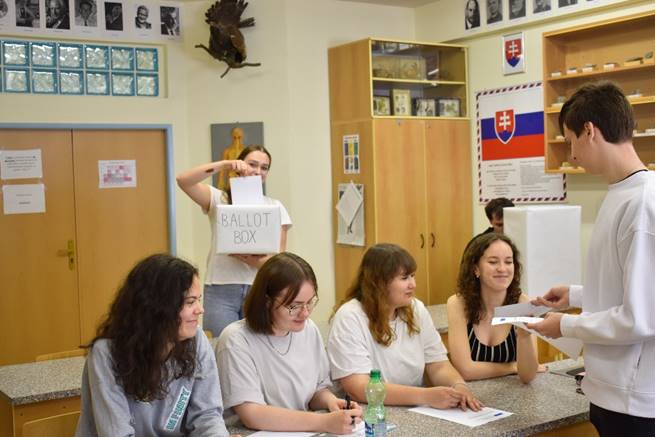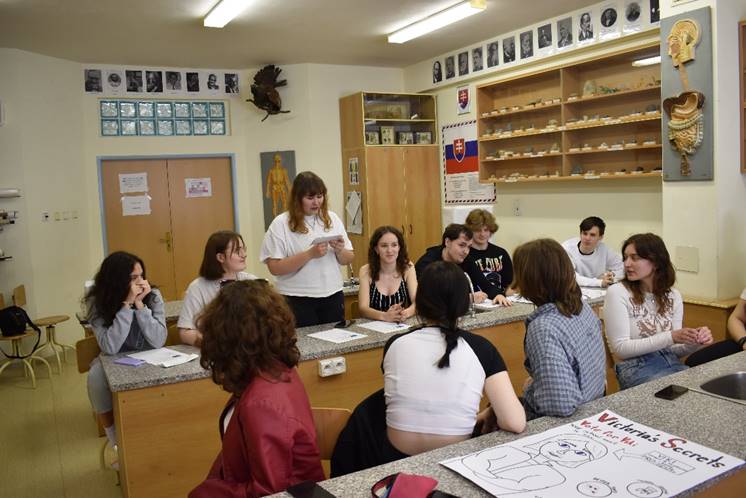Blog entry by Alena Cilíková
On May 24, 2023, Mgr. Alena Cilíková from Gymnázium Myjava led a Student Parliament Elections workshop that refers to the subject of Civic education.
This workshop was planned as a follow-up activity after covering the topic of the Political System. (Civic Education). It required a basic knowledge about the principles of elections and the voting system of a particular country. The aim of this workshop was to teach students civic responsibility through a sequence of activities connected with Student Parliament elections.
The students first discussed the role of the Student Parliament, before proceeding to activities connected with the election itself.
Questions to answer:
What problems do you face at school? Is there anything you miss? Is there anything you would like to improve? Is it possible to change anything by only one student? What is the importance of a student parliament?What opportunities does a student parliament provide students with?
Students agreed that a school parliament provides many opportunities, such as involving students in democratic processes and decisions making within the school, demonstrating the importance of representation and active involvement in the school community, democratically electing of student representatives, improve the school community by addressing student issues and concerns …

Pre-election phase
The students were separated into a few A groups – their task was to form their own political parties to pick their leader and to prepare a poster introducing their political programmes. Group B formed the Election Committee and prepared the ballot box and all the papers.
Teacher´s recommendation: I recommend A groups to be formed of maximum three students. We can let the students to choose their partners. If they have problems with that, they can be grouped randomly according to choosing the same number (we prepare three pieces of paper with number 1, three with number 2......, students with the same number form one group) The group B can consist of more students as they have more paperwork.
B group - preparations
They prepared the ballot box. They used a cardboard box with the opening on the top. This should be a large box clearly labelled and obviously placed. (It can be decorated with the national symbols). Students prepared the electoral register with the names of all the students in the class (including their owns), ballot papers where they wrote the names of the parties and their leaders, sufficient number of envelopes, a privacy booth from another cardboard box and they prepared instructions for voters at the polling station and instructions for polling workers.
Teacher´s recommendation: if students have not experienced the act of voting so far, preparing the instructions can be rather challenging. That ´s why the teacher´s help will be required. I suggest the following:
1.When you enter the polling station, tell them your name so they can check that you are on the electoral register.
2.Show your ID card. (if not ID card, any other document can be accepted, e.g. a student´s card)
3.Take your ballot paper with an envelope and go to a privacy booth to vote.
4.Vote for one candidate by circling the number before his name. In case of circling more or no candidates the ballot paper is invalid.
5.Put the ballot paper into the envelope and then insert it into the ballet box. Your vote will be kept safe and will always stay secret.
6.The elections have just finished for you.

Students should be given also instructions referring to the labour division at the pollling station such as checking the identity of voters, supplying them with the ballot papers, giving instructions how to vote, checking the validity of the ballot papers, counting only the valid votes, announcing the name of the winner .


A groups – preparing posters and voting speeches
Teacher´s recommendations: when preparing the speech and the programme, students can think of the current conditions at their school and consider possible changes referring to school rules, school canteen, furniture, equipment, after-school activities, eco-friendly attitude... All the promises should be achieveable. All students should be involved, either in creating the poster, preparing the programme or making the speech.
Students created attractive posters and while making a speech the other two students held the poster, so they presented it as a group. This activity was quite amusing and students really enjoyed it.



After preparing their campaigns and giving their voting speeches, the students experienced elections.

After counting the votes, the official winner was announced. The students developed communication skills, teamwork, creativity and public speaking. Through self and peer-assessment, students learnt to accept criticism and respect their opponents.

Some answers from the Workshop Evaluation Questionnaires:
- I learned to improve creativity and to cooperate with my classmates (repeated answer)
- I learned how the school parliament should work
- I learned election rules
- I learned how to start a political campaign
- I learned that confidence and spokesmanship will get you far
